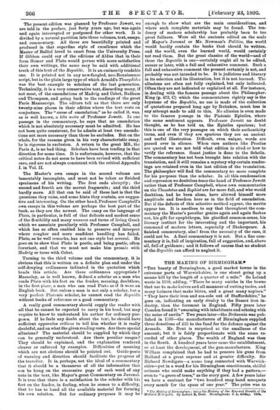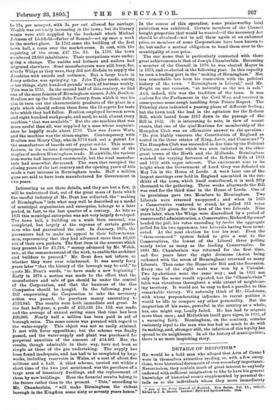THE MAKING OF BIRMINGHAM.*
"Tim beauty of Bermingham, a good market towne in the extreame parts of Warwickshire, is one street going up a meane hill by the length of a quarter of a mile." So Leland wrote in 1538, adding, `. There be many smiths in the towns that use to make knives and all mannoar of cutting tooles, and many loriners that make bittes, and a great many nay lors." " They have their iron and sea-cole out of Staffordshire," he goes on, indicating an early rivalry to the Sussex iron in- dustry, then the foremost in England. Fifty years later Camden found it "swarming with inhabitants and echoing with the noise of anvils." Two years later—the Britannia was pub- lished in 1586—the manufacturers of Birmingham supplied three donations of £25 to the fund for the defence against the Armada. Mr. Dent is surprised at the smallness of the amount; but it is fairly proportionate with the sums re- corded of other places. The wealth of England was then in the South. A hundred years later came the establishment, or at least the development, of the gun-manufacture. King William complained that he had to procure his guns from Holland at a great expense and at greater difficulty. Sir Richard Newdigate—a name long connected with Warwick- shire—put in a word for his Birmingham constituents, skilful artisans who could make anything if the' had a pattern,— even to "a grove of trees," as the story goes. A few years later we have a contract for "two hundred snap hand musquets every month for the space of one year." The price was to • The Making of Birmingham : beia9 the History of the Rise and Growth of the Mid?and lettr.Tolis. By Hobert R. Dent. Birmingham: J. L. LIMA/. 15944 be 17s. per musquet, with 3s. per cwt. allowed for carriage. Wealth was evidently increasing in the town; but its literary wants were still supplied by the bookstall which Michael Johnson of Lichfield—father of Samuel—set up once a week in the market-place. In 1702 came the building of the first town hall, a room over the market-cross. It cost, with the repairing of the cross, £17 15s. 31. In 1750, the town numbered 23,688 inhabitants. Their occupations were under- going a change. The smiths and loriners and nailers had migrated elsewhere. Steel manufacturers were still busy, for, sturdy Whigs as they were, they did not disdain to supply the Jacobites with swords and cutlasses. But a large trade in Lucy articles was springing up. John Taylor made, among (a her things, eight hundred pounds' worth of buttons weekly. Tula was in 1735. In the second half of this century, we find one of the moat famous of Birmingham names, John Boulton. Boulton set up the Great Soho Factory, from which it was his aim to turn out the characteristic products of the place in a style which should redeem them from the ill-repute for taste into which they had fallen. Boulton employed between seven and eight hundred workpeople, and used, he said, almost every machine "that was available." Bat the one machine that was more useful than all, was supplied by a man whose acquaint- ance he happily made about 1770. This was James Watt, and the machine was the steam-engine. Contemporary with Boulton was Henry Clay, who in 1772 took out a patent for the manufacture of boards out of papier-mache. This manu- facture, in its various developments, has been one of the staples of modern Birmingham trade. Meanwhile, the various iron-works had increased enormously, but the steel manufac- ture had somewhat decreased. The wars that occupied the closing years of the last century and the opening years of this made a vast increase in Birmingham trade. Half a million guns are said to have been manufactured for Government in two years.
Interesting as are these details, and they are but a few, it will be understood that, out of the great mass of facts which the careful industry of Mr. Dent has collected, the making of Birmingham" into what may well be described as a model of municipal organisation and enterprise, belongs to a. later period, in fact, to the last quarter of a century. As late as 1835 this municipal enterprise was not very largely developed. The town hall, a building on a scale then unusual, was completed, but largely at the expense of certain gentle- men who had guaranteed the cost. In January, 1835, the guarantors had to make an appeal to their fellow-towns- men, representing that they had advanced more than £6,000 out of their own pockets. The first item in the account which they present is for £1,310, "money advanced by Mr. Welch, sena at the commencement of the work, to enable the architect and builders to proceed." Mr. Dent does not inform us whether they were ever reimbursed. It was nearly forty years later "that the history of the borough may be said," to quote Mr. Dent's words, "to have made a new beginning Early in 1874 a motion was made to the effect that the manufacture and sale of gas should be under the control of the Corporation, and that the business of the Gas Companies should be bought. In the following year a Bill empowering the Corporation to take the necessary action was passed, the purchase money amounting to £553,845. The results were both immediate and great. In the first half-year, a profit of £25,538 15s. 11d. was made, and the average of annual saving since that time has been £60,000. Nearly half a million has been paid in aid of borough rates. The same course was pursued with regard to the water-supply. This object was not so easily attained. It met with fierce opposition; but the scheme was finally passed, and the water-supply and plant was purchased for perpetual annuities of the amount of £54,491. But the results, though admirable in their way, have not been so simple as those of the gas undertaking. The supply has been found inadequate, and has had to be completed by huge works, including reservoirs in Wales, at a cost of about five millions and a half. A third scheme, carried out within a short time of the two just mentioned, was the purchase of a large area of insanitary dwellings, and the replacement of them by new buildings. Here the financial results belong to the future rather than to the present. "This," according to Mr. Chamberlain, "will make Birmingham the richest borough in the Kingdom some sixty or seventy years hence."
In the course of this operation, some praiseworthy local patriotism was exhibited. Certain members of the Council bought properties that would be wanted—if the necessary Act should be obtained—not to sell them again at an enhanced price, as members of some Corporations have been known to do, but under a mutual obligation to hand them over to the municipality at cost price.
The one name that is particularly connected with these great achievements is that of Joseph Chamberlain. Becoming a member of the Council in 1870, he was elected Mayor in in 1873, and re-elected in the following year. In this capacity he took a leading part in the "making of Birmingham." Not less remarkable has been his connection with the political history of the town. "Birmingham is Liberal," said Mr. Bright on one occasion, "as naturally as the sea is salt." And, indeed, this was the tradition of the town. It was zealous for the Parliament in the Civil War, and received in consequence some rough handling from Prince Rupert. The Priestley riots indicated a passing phase of different feeling; but the town took the lead in the agitation for the Reform Bill, which lasted from 1812 down to the passage of the Bill in 1832. (It is interesting to note, in view of recent events, that one of the qualifications for membership of the Hampden Club was an affirmative answer to the question : "Do you highly venerate the Constitution of England as vested in the three estates of King, Lords, and Commons ? ") The Hampden Club was succeeded in due time by the Political Union, an association which was soon imitated in the other great towns of the North and the Midlands. Birmieghani watched the varying fortunes of the Reform Bill of 1831 and 1832 with eager interest. The excitement rose to its height when the Government of Lord Grey was defeated on May 7th in the House of Lords. A week later one of the largest meetings ever held in England assembled in the out- skirts of the town, which itself contributed, it is said, fifty thousand to the gathering. Three weeks afterwards the Bill was read for the third time in the House of Lords. One of its provisions gave two Members to Birmingham. Two Liberals were returned unopposed ; and when in 1815. a Conservative ventured to stand, he polled 915 votes only to 1,718 given for the first of the two Liberals. Nine years later, when the Whigs were discredited by a period of unsuccessful administration, a Conservative, Richard Spoonee headed the poll, his votes exceeding by twelve the aggregate polled for his two opponents, two Liberals having been nomi- nated. At the next election he lost his seat. Even the " three-cornered " system failed to give a seat to the Conservatives, the lowest of the Liberal three polling nearly twice as many as the leading Conservative. In 1880 Mr. Chamberlain IMB returned for the first time, and five years later the eight divisions (Aston being reckoned with the seven of Birmingham) returned as many Liberals. Then came the Home-rule Bill and the Secession. Every one of the eight seats was won by a Unionist. Two by-elections went the same way ; and in 1892 not only was the same result repeated, bat the "Chamberlain faith was victorious throughout a wide extent of neighbour- ing territory. It would not be easy to find a parallel to this remarkable victory. We naturally think of Mr. Gladstone, with whose preponderating influence in recent politics it would be idle to compare any other personality. But the magnetism of his name, powerful in the country as a whole, has, one might say, locally failed. He has had to migrate more than once ; and Midlothian itself gave signs, in 1892, of a wavering faith. Birmingham, on the contrary, remains eminently loyal to the man who has had so much to do with its making, and, stronger still, the infection of this loyalty has spread to its neighbours. In all the history of municipalitiea,, there is no more inspiriting story.



































 Previous page
Previous page